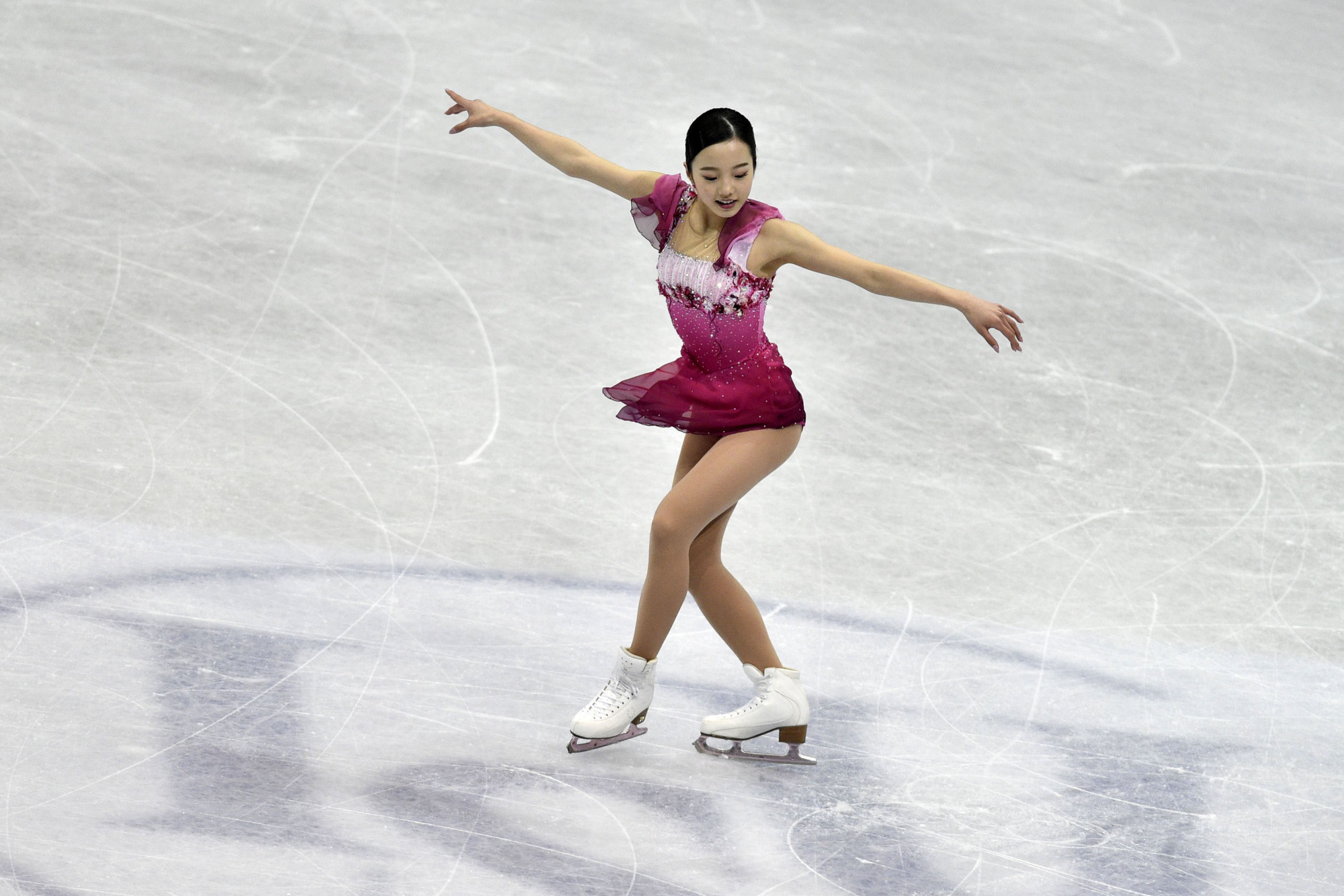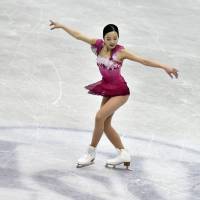Marin Honda saved her best for last.
After struggling through a season in which she admitted that being the reigning world junior champion had created stress for her, Honda responded with two fine programs to earn the silver medal behind Russia's Alina Zagitova at the world junior championships on Saturday in Taipei.
Honda was attempting to become the first Japanese female to defend the world junior title, but came up seven points short. In doing so, she joined Mao Asada in winning the world junior crown one year (2005), then placing second the next (2006 — behind Yuna Kim).
The 15-year-old Honda, fresh off her visit to the Arctic Edge Ice Arena to work with coach/choreographer Marina Zoueva, was the picture of confidence in both her short program and free skates.
The Kyoto native recorded personal bests in the short, free and total score on the way to the second-place finish. But the numbers were less important than the image she projected to the crowd and the judges — one in which her potential appears unlimited.
Honda's free skate to "Romeo and Juliet" was absolutely sublime, as she landed seven triple jumps and received level-fours for her spins and step sequence.
How good was it?
Here is how legendary skating writer Phil Hersh saw it in a Facebook post:
"It is utterly spellbinding —the most beautiful skating I have seen all season. Seamless, incredible flow out of jumps, terrific speed across ice, ethereal. Her component scores were WAY too low, so she finished second overall (and in free skate) to wonderful (great jumps) but much less refined skating by Alina Zagitova. I am so mesmerized by this I have just watched it back-to-back-to-back-to-back-to-back."
Honda appeared less overwhelmed than most observers.
"I believe I performed this year better compared to last year," Honda was quoted as saying by the ISU website after her free skate. "However, I am still disappointed with the result and with the performance. In practice, I was able to do such a clean performance like today only like five times. So, I was kind of surprised I did such a good job today."
Though it may have been a letdown for Honda not to take the title again, the score sheets of the judges told a different story. Honda received not a single negative grade of execution from the nine-person panel in either the short program or the free skate. That was an impressive feat in itself.
Japan junior champion Kaori Sakamoto joined Honda on the medal stand by claiming the bronze medal, while Yuna Shiraiwa, who was nursing a back injury, finished fifth.
"Two years ago I could have won with this kind of performance," Sakamoto commented after her free skate to "The Color Purple." "This year, the whole level of the competition is higher. So I couldn't make any mistakes. I am quite happy with my performance and that I didn't make any mistakes."
The victory capped an impressive season for Zagitova, but Ice Time did not entirely like the way it was achieved. She played by the rules and maximized her score by performing all of her jumps in both programs in the second half to earn bonus points (the base value of jumps being multiplied by 1.1).
After watching Zagitova's free skate to "Don Quixote," where it seemed like an eternity before she attempted a jump, I felt by her prioritizing the technical tally in place of a balanced program, something was being lost. There was just an artificial feel to it.
If skating is supposed to illustrate the fusion of athleticism and artistry, is it right for a skater to be madly cramming in jump after jump as the program is winding down?
Ice Time consulted an international coach, who requested anonymity, for their view on Zagitova's tactics.
"It's a strategy risk. It is more dangerous to do all of your elements in the second half," the coach stated. "Because once you start missing one and you start getting tired, having to get up and use more energy, the whole program can unravel and it's unbalanced."
The coach detailed how the current system rewards certain skaters for backloading programs with jumps.
"If you're able to be successful in the second half, then it probably demonstrates a very fit athlete," the coach commented. "Then there is the element of how it affects the PCs (program component scores) and this is going to be in the hands of the judges.
"From a sporting perspective, the concept is correct," said the coach. "From an artistic perspective, perhaps it unbalances the program."
The coach presented a scenario where it is essentially risk vs. reward.
"The challenges aesthetically will be subjective and the benefit in the second half of the program is not subjective, it's objective," the coach said. "From that perspective I would understand the argument of a person who says, 'It's not balanced. It's more beautiful this way. I couldn't disagree with that.'
"On the other hand, objectively, I would have to say, 'But it's much more physically, psychologically demanding to execute all of your elements in the second half because you don't want to miss.' Once you start to miss you can't make any more mistakes.
"If you spread your elements throughout the whole program, you've got time to recover from a mistake and get back on track, but if you put all of your elements in the second half of a program, you don't have any time to get back on track."
The coach admitted that the current setup had a negative impact on Honda in her effort to retain the title.
"There is no question in my mind that Marin Honda has an advantage aesthetically over Zagitova," the coach declared. "Having said that, Zagitova is no slouch. She is an amazing performer and an amazing athlete.
"But Marin Honda, just naturally through her pure beauty and sensitivity to the music, brings a little bit more that Zagitova doesn't have. The only way Zagitova can compete against that and beat that is by getting a technical advantage."
The coach outlined what they like about the current system.
"This system doesn't make it all beautiful. It allows the athletes to take their strengths and use that strength to their benefit," the coach noted. "For Marin, it is that beautiful sensitivity that she can take throughout the whole program, but probably means that she can't pile her jumps up all in one short period of time, which Zagitova could.
"I like the fact that you assess where you are strong, where you are weak you strategize your program and build around it. It may make it a bit less entertaining for some of the people who are looking for the pure beauty (of skating). But in any sport, it doesn't matter if it is soccer, baseball or whatever, strategy plays a role. At least a skater now has more freedom to build a strategy."
While understanding and respecting the need for balance in the system, Ice Time believes the ISU needs to alter the current rules and require skaters to perform at least one jump in the first half of the short program and two jumps in the first half of the free skate.
Best-selling skating writer Yoshie Noguchi sees it the same way Ice Time does.
"All jumps in the second half, it is just a technical challenge," she wrote in an email. "But I think figure skating has two aspects; art and sports.
"Skaters trying the two aspects with variance, it's ideal.
"Zagitova's skating is very slow and without flow. It depends on too much transition around the jumps."
Pressure on: With Satoko Miyahara announcing her withdrawal Monday from the upcoming world championships due to continuing pain from the stress fracture in her hip, the burden on Mai Mihara, Wakaba Higuchi and substitute Rika Hongo has grown exponentially.
Japan's top two finishers at the worlds have to place a combined 13th or better if the Hinomaru is to retain its three spots for women's singles at the Pyeongchang Olympics. Ice Time thinks Mihara is now going to have to finish very close to the medal stand to make this happen.
Looking ahead: With Honda, Sakamoto, and likely, Shiraiwa, having closed out their junior careers, fans must already be envisioning the night this coming December at the Japan nationals when the team for Pyeongchang will be decided.
If Japan does retain its three Olympic spots in women's singles, you could have Miyahara, Mihara, Higuchi, plus Honda, Sakamoto and Shiraiwa all vying for those precious positions. Then factor in Mao and you can see that it will most certainly be an evening of high drama.
It's nights like those that bring out the true greatness of the sport.
Teaming up: Skating greats Miki Ando and Michelle Kwan both traveled to Austria last week to act as ambassadors at the Special Olympics World Winter Games currently being staged in the cities of Graz, Schladming and Ramsau.
The two former champions posted photos on their social media accounts with athletes, coaches and each other. It is nice to see these two great champions giving their time to such a worthy cause.



















With your current subscription plan you can comment on stories. However, before writing your first comment, please create a display name in the Profile section of your subscriber account page.